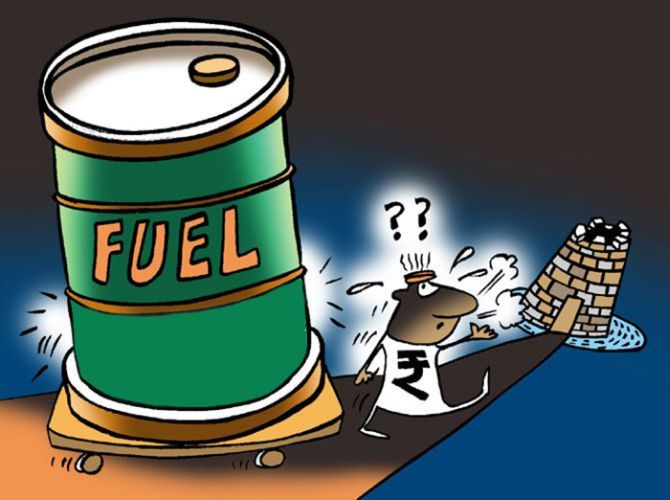India must be prepared for a big, fat fuel import bill in FY23 — barring any further avatars of the Covid virus — as refiners crank up runs, or crude processing rates, to meet the growing demand for fuels, and crude prices soar.

Capacity additions by an Indian state-run refiner will reinforce the need for foreign crude.
Demand for all fuels is expected to increase by 3-8 per cent next fiscal from 2021-22, reaching pre-pandemic levels, according to analysts and industry experts.
Petrol use is forecast to increase 5-9 per cent and diesel consumption 2-6 per cent.
Only aviation fuel is expected to stay below 2019 levels.
Higher crude processing by refiners coupled with a consistent decline in domestic oil production may leave India needing over 225 million tonnes (mt) of imported grades based on an 89 per cent import dependency seen in 2019-20.
Refiners will end up spending over $150 billion on crude purchases, over 5 per cent of India’s GDP, based on current oil price forecasts.
A pickup in capex, higher spending on infrastructure and normalised movement of goods will drive demand for diesel, said M K Surana, chairman, Hindustan Petroleum.
Use of petrol will increase once people start heading back to office, schools open and aviation picks up, he said, pegging overall fuel demand to rise 7-8 per cent.
Diesel accounts for around 38 per cent of India’s overall fuel basket and determines fuel demand growth, though its importance as India’s premier transport fuel is waning with the ascendancy of petrol-driven vehicles.
Demand for petrol will increase 5 per cent above the pre-pandemic 2019-20 levels, while diesel use will be marginally higher, Surana said.
Demand for all fuels rose 5 per cent in the April-December period to 148 mt from a year earlier, according to the oil ministry.
Surana expects the fiscal to end at around 200 mt, below the pre-pandemic 214 mt. Demand for petrol increased by 14 per cent in the April-December period, while diesel consumption rose by 7.7 per cent.
Both fuels together account for over half of India’s fuel mix.
The increase in demand for transport fuels is underpinned by an increase in sales of passenger vehicles by 10-14 per cent in FY23, with two-wheeler sales expected to increase 4-6 per cent, CRISIL director of research Hetal Gandhi said.
The improvement in vehicle sales will drive petrol use higher by 6-9 per cent year-on-year in FY23 triggered by an increase in preference for personal mobility, Gandhi said.
Two-wheelers account for over 70 per cent of petrol consumption.
But consumption of diesel will lag because the use of the fuel shrank by 12 per cent in 2020-21 as the country went into a lockdown for several months disrupting the transport of goods.
The shrinkage may not be fully compensated by a recovery in diesel demand by an estimated 4-6 per cent next fiscal on the back of commercial vehicle sales growing by 13-18 per cent from a year earlier.
The extent of a rebound in diesel use was also limited by extended rainfall last year, hurting agricultural, mining and industrial activities.
ICRA’s analyst Prashant Vashist is measured in his forecasts.
He expects overall fuel use at around 209 mt next fiscal, growing by 3-4 per cent year-on-year.
He anticipates petrol demand to rise by 5 per cent and diesel by 2 per cent, as CNG makes inroads in cities and towns displacing diesel use.
Variations of a few million tonnes in the estimates make little difference compared to what India will end up paying for imported crude next fiscal.
The country depends on overseas crude sourced from Iraq, Saudi Arabia and the United Arab Emirates (UAE) among others to meet 86 per cent of its needs.
That dependence will increase to 90 per cent, according to the International Energy Agency (IEA).
The dependence on overseas supplies in a high-priced oil market leaves the country vulnerable to higher inflation and a weaker rupee, which subsequently affects bond yields, driving up borrowing costs.
Goldman Sachs expects Brent prices at $90 a barrel (/bl) this quarter, $95 in the second quarter and $100 in the last two quarters of calendar 2022.
Brent will average $96/bl in 2022 and $105/bl in 2023.
Imports primarily depend on the capacity at which India’s refiners operate their plants, and how much new capacity will be added.
Domestic output is steadily declining because of a lack of new discoveries.
Hindustan Petroleum has added 2 mt a year to its Mumbai refinery and will add 6.7 mt a year to its Vizag plant between April and December.
Indian refiners plan to process more crude going forward, reaching pre-pandemic levels, anticipating higher margins.
Gross refining margins, especially diesel and gasoline, should rise further as permanent supply-side shutdowns and reasonably strong mobility support margins despite Covid variant concerns, Morgan Stanley said.
India has a nameplate refining capacity of 250 mt, which will increase to around 259 mt after Hindustan Petroleum’s additions.
Runs at an estimated 236 mt this fiscal are still lower from pre-pandemic levels of 254.4 mt after the country was hit by the Delta and Omicron variants, based on oil ministry data.
India paid $82.4 billion — more than adequate to cover the bill for both fertiliser and food subsidies — for 156.4 mt of crude in April-December at an average of $72.7/bl, according to the oil ministry.
At this rate crude imports will total 210 mt this fiscal, costing a record $111 billion.
That’s higher than the $101.4 billion India spent in 2019-20 for 227 mt of purchases when crude averaged $60.5/bl.
So it’s easy to understand why the government is on an overdrive to push electric vehicles.











